How we socialise our amazing puppies! #InternationalAssistanceDogWeek
Posted 8 years ago in the Volunteers and fundraisers category
To celebrate International Assistance Dog Week, find out what it takes to socialise an assistance dog of the future!
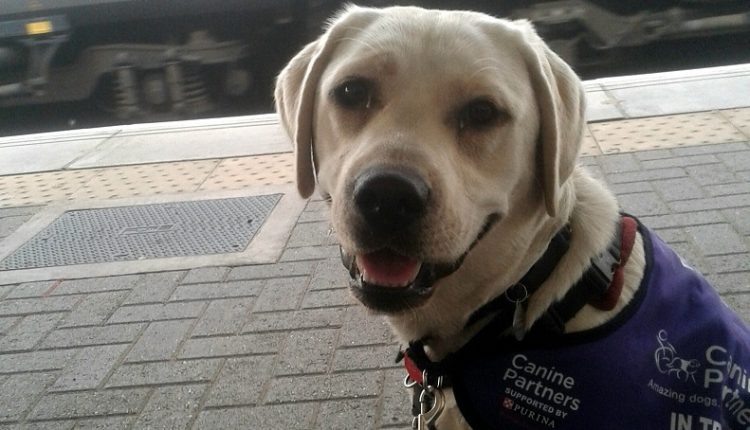
To celebrate International Assistance Dog Week, we are sharing lots of photos, videos and information about our amazing dogs and the journey they take to become an assistance dog.
In this blog post, we thought we would share with you how our puppies in training are socialised by their puppy parents between 8 weeks and 14 months old.
What is puppy socialisation?
In order for an adorable puppy to become a loyal assistance dog, they need to have a gentle nature, as well as being curious and friendly! They will develop these traits from good socialisation with their puppy parent.
Socialisation is the learning process a pup will go through to develop the skills it needs to be happy in a multitude of environments and around lots of different people. It also involves gaining an understanding of what is right and wrong behaviour.
All puppies should go through proper socialisation as they grow up to avoid being antisocial and difficult as an adult dog, but it is especially important for an assistance dog in training. This is because he or she will need to be able to adapt to a number of different situations when out and about with their partner in the future.
Puppy classes
One of the socialisation activities that all of our pups take part in is regular puppy classes with the rest of the puppies in their local area (or “satellite”). These classes are run by our satellite trainers and are designed to teach the puppies obedience, social skills and the core tasks of touching, tugging and retrieving. These skills form the foundation of what they will learn as part of their advanced training at our training centres.
They will also learn fun new experiences like walking on different surfaces as well as balancing by climbing up and down steps.
Watch our video below to see what else our “puppy school” students get up to!
Out and about
When the puppy grows up, they will be matched with a person with disabilities. This amazing partnership will go on many adventures together, so part of a puppy’s socialisation training is to go to lots of different places to get used to environments they may not yet be familiar with.
Here are just a few of the places that our pups will visit as part of their socialisation.
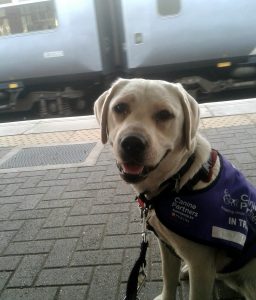
Public Transport
Many of our partners rely on public transport to get from A to B, and so our puppy parents take our puppies in training on the bus and on the train to get them accustomed to climbing aboard, settling while travelling and then alighting when it’s time to get off.
Trains and buses can often be busy environments so it’s a great way to get used to being in a crowded place where there are often lots of distractions to contend with!
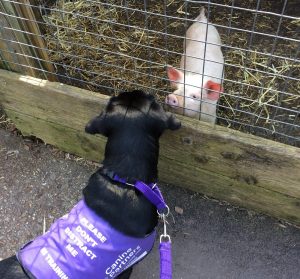
Farms
Our puppy parents will take our puppies in training to the farm because there are lots of sights and smells to see and sniff! Plus of course, there are farmyard friends to be made.
Distractions are also aplenty at farms, so it’s a good experience for the puppies to learn how to control those urges to wander.
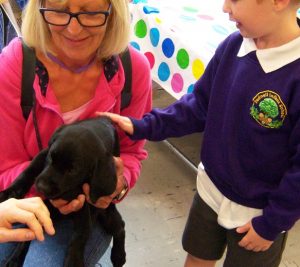 Schools
Schools
Being a puppy among a group of schoolchildren can be quite an intense experience!
Our puppies in training will visit schools so that the children can learn about assistance dogs and how to approach the puppies, while the puppy will learn to be calm and get used to controlled fuss and attention.
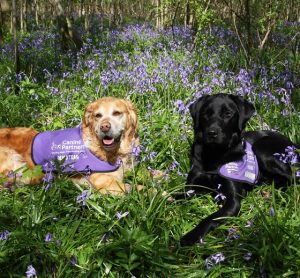 Events
Events
If you ever come along to one of our national or community events, you will often find out puppies and training are in attendance, too.
Joining in at events is a great opportunity for our puppies in training to meet lots of different people – and they may even bump into a canine partner for a glimpse into their future!
Could you help us socialise more amazing puppies?
Our puppy parent volunteers are crucial in the training of our amazing dogs. Without puppy parents, our puppies would not have the skills they need to become an assistance dog. If you want to find out more about volunteering as a puppy parent, or apply today, visit our Puppy Parents page.